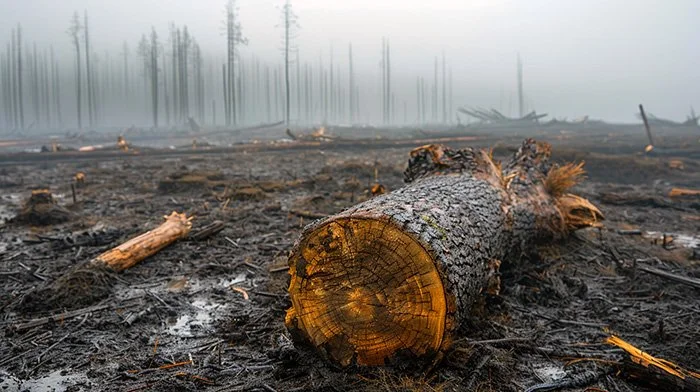How Traditional Farming Affects Climate Change
Agriculture significantly impacts climate change, contributing to greenhouse gas emissions, deforestation, and water depletion. As the global population grows, the demand for food increases, exacerbating these environmental challenges.
Vertical farming emerges as a sustainable alternative, leveraging controlled environment agriculture to grow crops more efficiently. This innovative method minimizes land use, conserves water, and reduces the need for chemical fertilizers and pesticides, offering a promising solution to mitigate the agricultural sector's environmental footprint while ensuring food security for the future.
The Impact of Traditional Farming on Climate Change
Methane Emissions: Traditional farming, especially through livestock and rice paddies, significantly contributes to methane emissions. Livestock, such as cows, produce methane during digestion, while flooded rice fields create conditions that encourage methane-producing bacteria.
Soil Degradation: Practices like tilling and monoculture strip the soil of its nutrients and structure, leading to erosion and diminished land productivity over time. This degradation not only affects crop yields but also releases stored carbon dioxide into the atmosphere.
Agricultural Runoff: The use of fertilizers and pesticides in traditional farming can lead to runoff that contaminates water bodies, harming aquatic life and ecosystems. This runoff can create dead zones in oceans where marine life cannot survive.
Food Miles: The global transport of food contributes significantly to carbon emissions, with products traveling vast distances from farm to consumer. This long supply chain exacerbates climate change by increasing the carbon footprint associated with food production.
Chemical Fertilizers: The production and use of chemical fertilizers are energy-intensive processes that contribute to greenhouse gas emissions. Moreover, these fertilizers can degrade soil health and pollute water sources.
Deforestation: Clearing forests for agricultural use not only destroys habitats but also releases carbon stored in trees into the atmosphere. This deforestation is a double blow to the planet's ability to mitigate climate change, reducing carbon sinks while increasing carbon sources.
Each of these factors illustrates the complex ways in which traditional farming practices contribute to climate change, highlighting the need for sustainable alternatives like vertical farming to secure our food systems and protect the environment.
Introduction to Vertical Farming
Vertical farming is an innovative agricultural approach that grows crops in stacked layers, often in controlled environments. This method utilizes soilless farming techniques such as hydroponics, aeroponics, or aquaponics.
By focusing on vertical growth, it dramatically reduces land use, conserves water, and minimizes the need for chemical inputs.
How Vertical Farming Addresses Traditional Farming Issues
Vertical farming addresses traditional farming's environmental challenges by reducing methane emissions, preventing soil degradation, eliminating agricultural runoff, cutting down food miles, and avoiding the need for deforestation.
This sustainable approach not only aims to mitigate the adverse effects of conventional agriculture on climate change but also enhances food security in urban environments.
| Criteria | Eden Green's Vertical Farms | Traditional Farms |
|---|---|---|
| Land Use | 99% less land used | Uses more land |
| Water Use | 98% less water used | Uses more water |
| Food Miles | 85% fewer food miles, with produce grown within 300 miles of consumers | Longer food miles, often involves global transportation |
Benefits of Vertical Farming
Reduced Land and Water Use: Vertical farming utilizes significantly less land by growing crops in vertically stacked layers, making it highly efficient for urban areas. Water use is reduced by up to 70% through recirculating systems, conserving this precious resource.
Elimination of Soil and Chemical Fertilizers: This farming method often uses hydroponics or aeroponics, eliminating the need for soil and drastically reducing the use of chemical fertilizers, leading to more sustainable crop production.
Year-Round Production in Controlled Environments: Vertical farms can produce crops throughout the year, irrespective of external weather conditions. This constant production enhances food security by ensuring a steady supply of fresh produce.
Reduction in Food Miles: By situating farms closer to urban consumers, vertical farming significantly reduces the distance food travels from farm to table, lowering the carbon footprint associated with food transportation.
Biodiversity and Ecosystem Preservation: Vertical farming minimizes the impact on natural habitats and forests, contributing to the preservation of biodiversity and ecosystems by reducing the need for new agricultural land.
The Future of Farming and Climate Change
The future of farming and climate change is intertwined with technological innovations in vertical farming and the collective action of policies and consumers.
Advancements in LED lighting, nutrient delivery systems, and climate control technologies promise to make vertical farming more efficient and scalable. Policies can encourage sustainable practices through incentives, while consumer demand for locally grown, sustainable produce can drive market shifts.
Together, these elements play pivotal roles in shaping a more sustainable agricultural landscape that addresses food security and environmental challenges.
Partner With Eden Green Technology
As we stand at the crossroads of agriculture and climate change, Eden Green Technology presents a pioneering opportunity in Controlled Environment Agriculture (CEA) and impact investing.
We invite investors passionate about sustainable solutions and eager to contribute to a greener future to explore how their investments can drive innovation in vertical farming. By partnering with Eden Green, investors have a unique chance to impact food security, environmental sustainability, and economic growth.
Let's work together to shape the future of farming. Reach out to Eden Green Technology to become part of this transformative journey.



